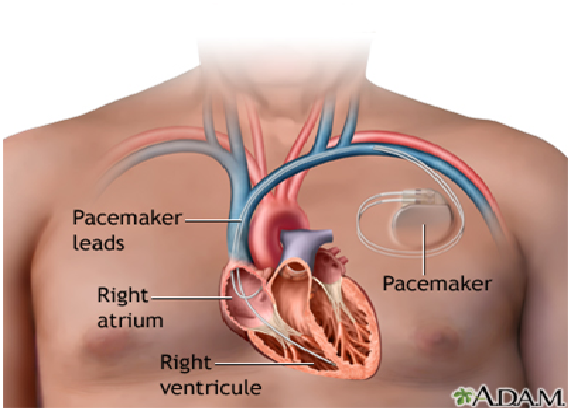What is a pacemaker check?
If you have had a pacemaker implanted you need to have it checked at regular
intervals. This is the timetable for your check-up’s:
• 24 hours after it has being implanted
• 6 weeks after the implant date
• 3 months after the 6 week date
• 6 months after the 3 month date
• 1 year after the 6 month date
• Once a year after that.
The check-ups are performed in the diagnostic cardiology department by a technician who will have a computer to check to ensure the pacemaker is working properly. They can modify it for you at each appointment to best suit your own heart.
How is a pacemaker check performed?
You will be brought into the pacemaker room. The technician will ask you to remove your top clothes. When you are undressed you will be asked to lie flat on an examination couch. The technician will apply 3 or 4 small stickers called “electrodes” to your chest. The special magnet will be placed over the pacemaker on your chest. The computer then “talks” to the pacemaker and tells us how it has been working. The technician can adjust the settings on the pacemaker using this magnet and computer. You will not feel anything during the check. The technician may ask you various questions during this to see how you are getting on. The check-up can take up to 30-40 minutes, depending on how complicated your particular pacemaker is.
If you have had a pacemaker implanted you need to have it checked at regular
intervals. This is the timetable for your check-up’s:
• 24 hours after it has being implanted
• 6 weeks after the implant date
• 3 months after the 6 week date
• 6 months after the 3 month date
• 1 year after the 6 month date
• Once a year after that.
The check-ups are performed in the diagnostic cardiology department by a technician who will have a computer to check to ensure the pacemaker is working properly. They can modify it for you at each appointment to best suit your own heart.
How is a pacemaker check performed?
You will be brought into the pacemaker room. The technician will ask you to remove your top clothes. When you are undressed you will be asked to lie flat on an examination couch. The technician will apply 3 or 4 small stickers called “electrodes” to your chest. The special magnet will be placed over the pacemaker on your chest. The computer then “talks” to the pacemaker and tells us how it has been working. The technician can adjust the settings on the pacemaker using this magnet and computer. You will not feel anything during the check. The technician may ask you various questions during this to see how you are getting on. The check-up can take up to 30-40 minutes, depending on how complicated your particular pacemaker is.
What information can be obtained from a pacemaker check?
Along with checking the battery levels and that it is functioning correctly the pacemaker can be re-programmed to best suit your heart. As everyone is different, the pacemaker needs to be set-up specifically for you. The technician may ask you to go for a short walk and return to us after 5 minutes, from this we can see how your heart performs when you are walking / exercising. All this information is kept in a special chart in our department.
What happens after a pacemaker check?
The stickers will be taken off your chest and you may get dressed again. You will then be given an appointment for your next pacemaker check. The result will be recorded in your special pacemaker chart and kept until your next check-up. The technician can tell you if your pacemaker is working properly.
Along with checking the battery levels and that it is functioning correctly the pacemaker can be re-programmed to best suit your heart. As everyone is different, the pacemaker needs to be set-up specifically for you. The technician may ask you to go for a short walk and return to us after 5 minutes, from this we can see how your heart performs when you are walking / exercising. All this information is kept in a special chart in our department.
What happens after a pacemaker check?
The stickers will be taken off your chest and you may get dressed again. You will then be given an appointment for your next pacemaker check. The result will be recorded in your special pacemaker chart and kept until your next check-up. The technician can tell you if your pacemaker is working properly.

Cardiac Specialty Care
• Structural Heart Disease
• TAVR
• CardioMEMS (Heart Failure)
• PFO Closure
• TAVR
• CardioMEMS (Heart Failure)
• PFO Closure
• Coronary Intervention
• Complex Higher-Risk (And Indicated) Patients (CHIP) Angioplasty
• Atherectomy
• Impella and ECMO Support
• Complex Higher-Risk (And Indicated) Patients (CHIP) Angioplasty
• Atherectomy
• Impella and ECMO Support
• Peripheral Angioplasty
• Varicose Vein Treatment (Venous Ablation)
• DVT thrombectomy - IVC filter
• Carotid Stenting
• Varicose Vein Treatment (Venous Ablation)
• DVT thrombectomy - IVC filter
• Carotid Stenting
• Rhythm Management
• Pacemaker
• Holter Monitoring
• Exercise Stress Test
• Echocardiography
• Nuclear Stress Test
• Enhanced External Counterpulsation (EECP)
• Pacemaker
• Holter Monitoring
• Exercise Stress Test
• Echocardiography
• Nuclear Stress Test
• Enhanced External Counterpulsation (EECP)
